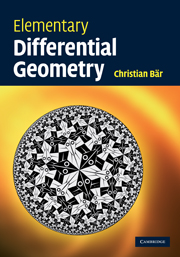Book contents
- Frontmatter
- Contents
- Preface
- Notation
- 1 Euclidean geometry
- 2 Curve theory
- 3 Classical surface theory
- 4 The inner geometry of surfaces
- 5 Geometry and analysis
- 6 Geometry and topology
- Appendix A Hints for solutions to (most) exercises
- Appendix B Formulary
- Appendix C List of symbols
- References
- Index
- Plate section
5 - Geometry and analysis
Published online by Cambridge University Press: 05 June 2012
- Frontmatter
- Contents
- Preface
- Notation
- 1 Euclidean geometry
- 2 Curve theory
- 3 Classical surface theory
- 4 The inner geometry of surfaces
- 5 Geometry and analysis
- 6 Geometry and topology
- Appendix A Hints for solutions to (most) exercises
- Appendix B Formulary
- Appendix C List of symbols
- References
- Index
- Plate section
Summary
Surfaces with boundary are introduced. The divergence theorem of Gauss is derived and used to show that the total Gauss curvature of a compact regular surface does not depend on the Riemannian metric.
The divergence theorem
In this section we want to derive a two-dimensional analogue of the fundamental theorem of calculus. In this theorem the integral of a derivative over a one-dimensional interval is identified with the difference of the values at the end-points. This term in the values at the end-points can be considered as the integral of the function over the (zero-dimensional) boundary of the interval. The divergence theorem expresses the integral of a derivative of a vector field as a one-dimensional line integral. To make all this precise we first need the notion of a surface with boundary.
Definition 5.1.1 A surface with boundary is a closed subset S of a regular surface Sreg ⊂ ℝ3 such that for every point p ∈ S there exists a local parametrisation F : U → Sreg of Sreg with p ∈ F(U), such that either
F(U) ⊂ S (then p is called an interior point of S) or
F−1(p) = (x, 0)⊤ for an x ∈ ℝ and F−1(S) = {(x, y)⊤ ∈ U| y ≥ 0} (then p is called a boundary point of S).
Information
- Type
- Chapter
- Information
- Elementary Differential Geometry , pp. 223 - 238Publisher: Cambridge University PressPrint publication year: 2010
